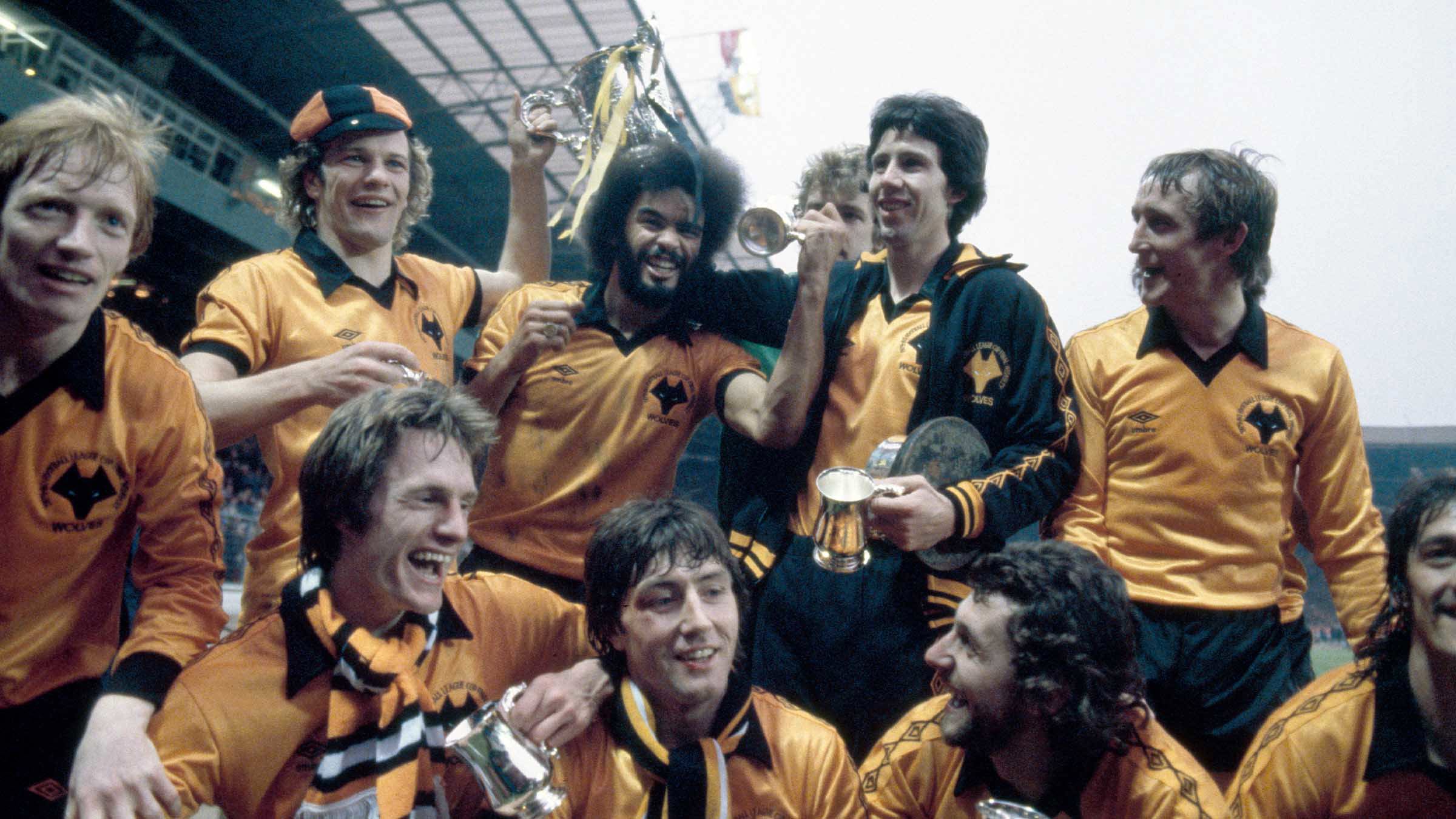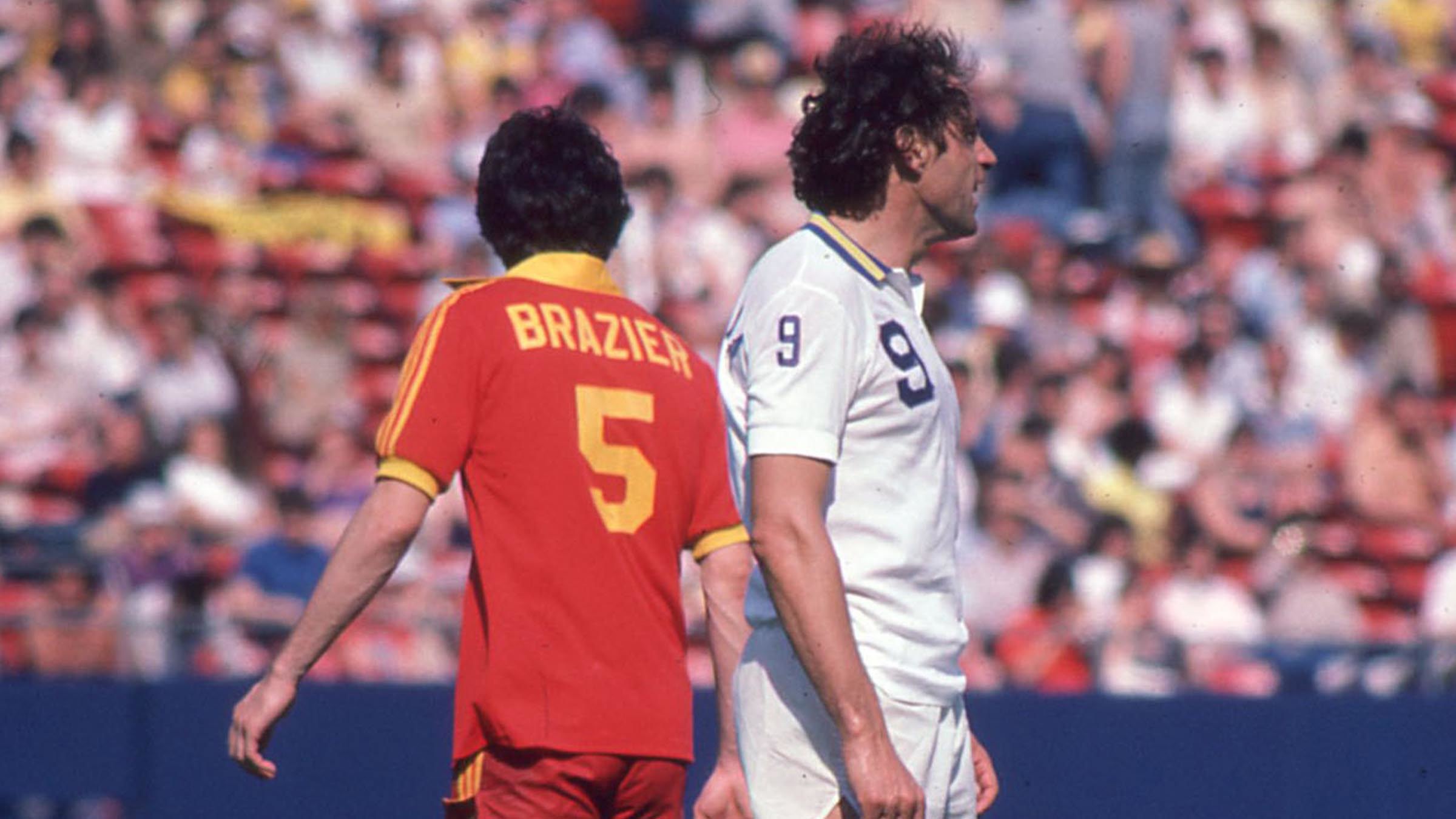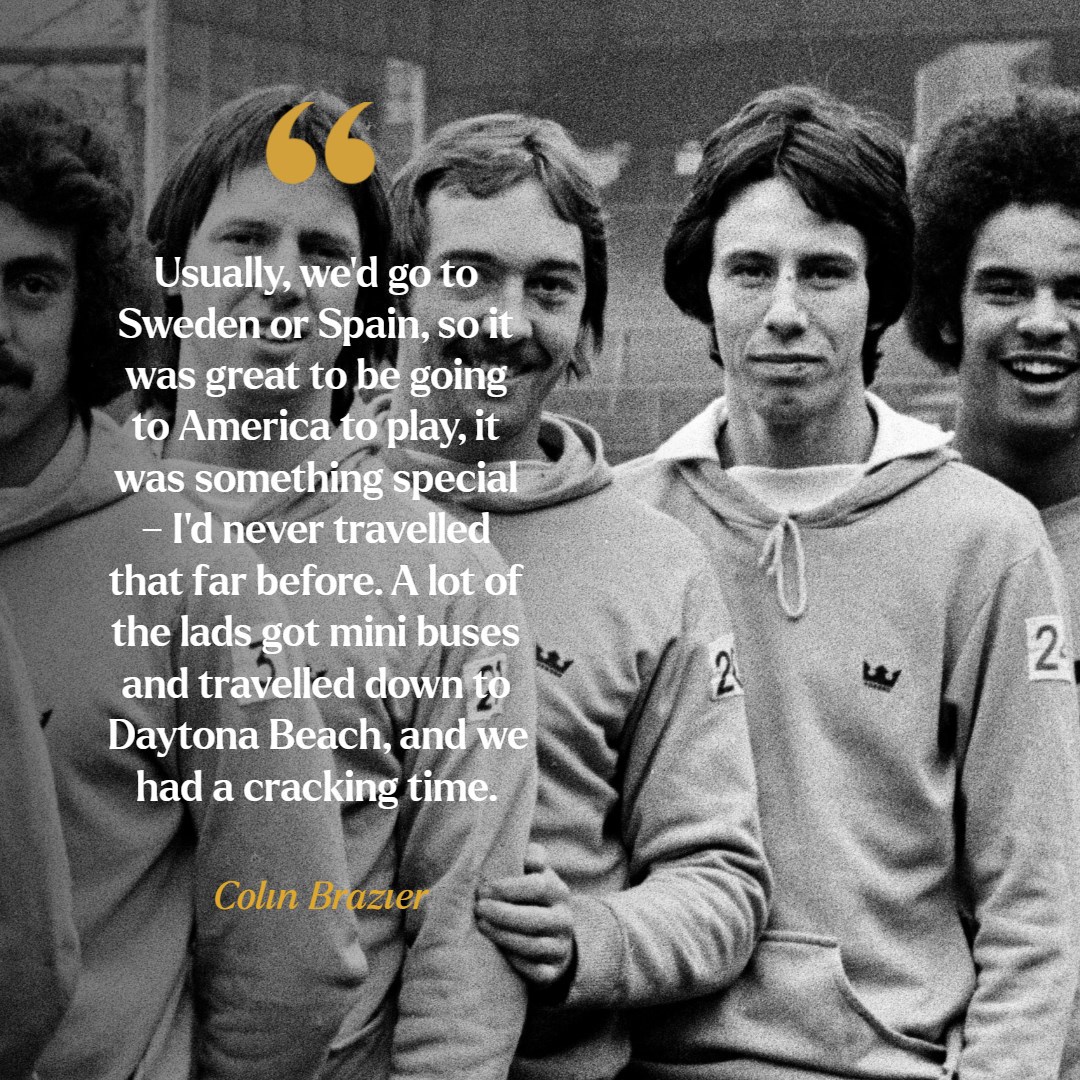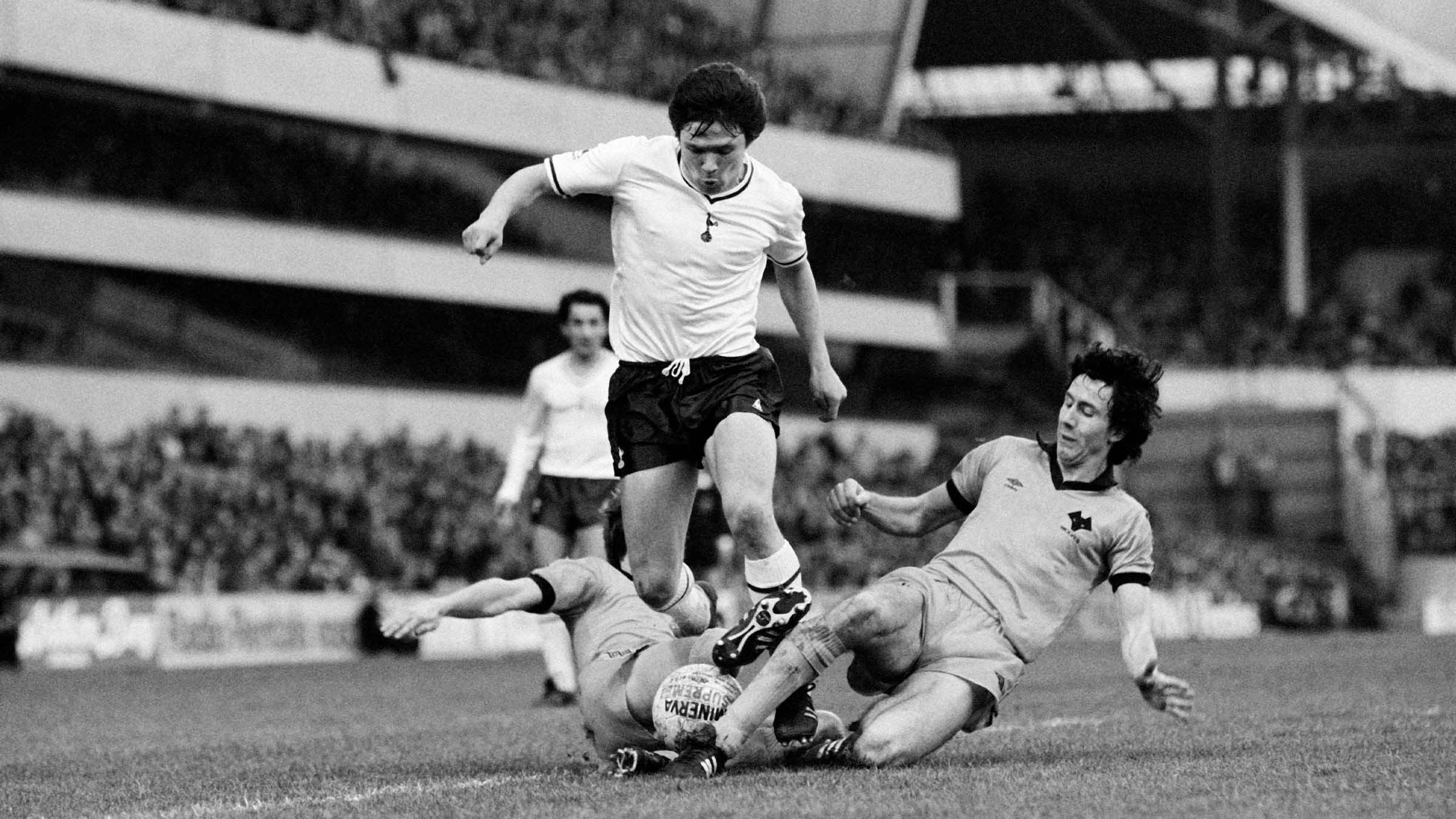For many of Wolves’ 1980/81 squad, a post-season trip to Jacksonville opened eyes to the bright lights of the United States, and particularly those of Colin Brazier, who was so fixated, he returned on a permanent basis that very same summer.
In May 1981 John Barnwell took his first-team group to Florida for a post-season friendly with the Jacksonville Tea Men, but also a wind down after what had been a difficult First Division campaign, and it was just the third time Wolves had stepped foot on American soil.
Few traces remain of the friendly – even goal scorer John Richards recalls very little about the 4-1 reverse – however, for Brazier, the visit was more impactful, as later that month he’d signed for the Jacksonville Tea Men on loan, in a move he’d make permanent the following campaign.
Now, as Wolves prepare for a 2024 pre-season trip to Jacksonville, 66-year-old Brazier, who played 91 times for the Old Gold, fondly recalls his own memories of making Florida his home in the early 1980s.
“We were living the dream,” he explained. “I lived on a golf course and the beach was 15 minutes away – you had everything you wanted. We were treated fantastically in the US, and I’d tell everyone to go over there because the lifestyle is so good. In any part of the country, it’s absolutely wonderful.
“The travelling could be hard. Some away games were thousands of miles away because you’d travel the whole space of America and Canada. But we had a day in New York, Chicago, Seattle – a few hours off for sightseeing. We came back from San Francisco on a jumbo jet with about 50 people partying all the way back, it was like superstar status the way they looked after us.”

Brazier (jacketed) celebrates Wolves' 1980 League Cup final win over Nottingham Forest.
During that era, Wolves were making US trips once a decade, first in 1963, then 1972, and now Brazier was part of the ‘Class of the 1980s’. The East Coast presented beaches and Disney World, which proved popular amongst the Old Gold stars, and Brazier, who was visiting the States for the first time, was determined to soak it all in.
“Usually, we’d go to Sweden or Spain, so it was great to be going to America to play, it was something special – I’d never travelled that far before. A lot of the lads got minibuses and travelled down to Daytona Beach, and we had a cracking time. It was a time where America was growing the sport and everyone could join in – all genders, ages or sizes.
“We were lucky to be out there in Florida, expecting to beat them quite easily, but it was different with the heat out there and the pitches, but it was a wonderful trip really. They loved the English out there – you said one word and they’d talk to you all day.
“People only ever asked if we were from Liverpool because of the Beatles. Norman Bell was out there the year before, and he was telling us about the way of life. We were laughing at him in his shorts and flip flops, and he told us to give it half an hour and we’d be the same, because of the heat. It was a learning curve, seeing the world.”

Brazier (left) in his playing days with the Jacksonville Tea Men (Photo: Stan Green).
As a player, in many ways, Brazier was beyond his years. A central defender who looked to get the ball down and play, he was also a prolific goal scorer during his non-league days with Northfield Town, for whom he left for Wolves in 1973.
While unable to fully nail down a starting place during his seven years as a professional at Molineux, he did chalk up close to a century of appearances and was an unused substitute for the club’s famous 1980 League Cup win over Nottingham Forest at Wembley.
However, that modern style of play always left managers wary to trust him – a Maximilian Kilman or John Stones of his day – and when a move to Leeds United fell through due to the departure of Jimmy Armfield, a reluctant Molineux exit was on the cards, and was confirmed when Ian Greaves arrived as manager.
“When I was in the reserves, in my second or third game I got the ball off the goalkeeper, played three one-twos and stuck it past the Villa goalkeeper and I thought that would show what I could do. I got lambasted. I love the Wolves and the fans, and we got to know a lot of them because it wasn’t like today, we’d go the pub after the game and have a good time with them. If I’d have got past that period, I could have been a 10, 12-year player at the Wolves.
“I scored a hat-trick on the Tuesday, two goals on the Saturday and a hat-trick on the Tuesday night for the reserves and Ian Greaves called me in to offer the good and bad news – the bad news was he was letting me go and the good news was that I could go back to America, and I was back in America on the Thursday.
“I was going to Madeira with my ex-wife and her mum and dad at Birmingham airport, but the airplane had a cracked windscreen, so we had to land in Luton. When we landed, I got a Tannoy message to say to call a number and it was the lads in America. They said they wanted me to go there right then, so I left them, got my stuff together and flew to America.
“I played there until September and came home. Wolves was all change and they said I could go back to America, and I jumped at it because I was on £200 a week in England and £1,000 a week in America, playing against the world’s greats.
“The standard of football was good, with so many world class players. I played against Steve Daley, Kenny Hibbitt and ‘Lofty’ [Phil Parkes]. There were some good teams there.”

Brazier was moving during a period of trajectory for the sport in the US. George Best played for San Jose Earthquakes, Johan Cruyff was with the Washington Diplomats and the Fort Lauderdale Strikers had signed Gerd Muller.
In 2024, the MLS have identical rules to Europe, but 43 years ago, during its infancy, football in America was trialling new inventions. Often played on astroturf – the Tea Men were one of few clubs who played on grass – games were different, but Brazier embraced everything his new surroundings had to offer.
“They’d have two-minute breaks in the game for television adverts and you couldn’t draw so from the 15-yard line you’d have ten seconds to dribble and put it past the goalkeeper. Each team would have five attempts, like a penalty shootout now. We also had the 35-yard line, which you couldn’t be offside before and it was pushed back to normal. It meant you couldn’t play on halfway, which opened it up for the midfield.
“We were always playing against quality out there, so you had to be on your toes and playing. I played out there with Archie Gemmill, Tony Brown and Keith Bertschin. It was such a different game to England, but I would have stayed out there if the club hadn’t folded.”

Brazier (right) slides in on Tottenham Hotspur's Steve Perryman in February 1982.
A permanent Tea Men player for the 1982 season, which ran over the summer months, Brazier was forced into a decision that autumn, with the league folding due to unregistered players being used elsewhere. Some overseas players remained to compete in a six-a-side league, but with years of 11-a-side football ahead of him, a return home was due for Brazier and his then wife.
“Jacksonville was a commercial place – there wasn’t many English people there, but it was like a holiday camp. For training, you’d get your flipflops on, a towel over your shoulder, we’d do a couple of hours in the heat and then we were either on the beach or the golf course.
“We weren’t superstars but went out there and introduced ourselves to them and loved it. The Wolves lads then, and still are, a wonderful bunch of lads I can’t say anything bad about them. We were treated with respect, and we made lots of friends out there.”
Brazier returned to the UK to sign for Birmingham City in October 1982 and spent three successful seasons with Walsall, and is still based in the West Midlands now, but holds Jacksonville and the US very close to his heart.
























